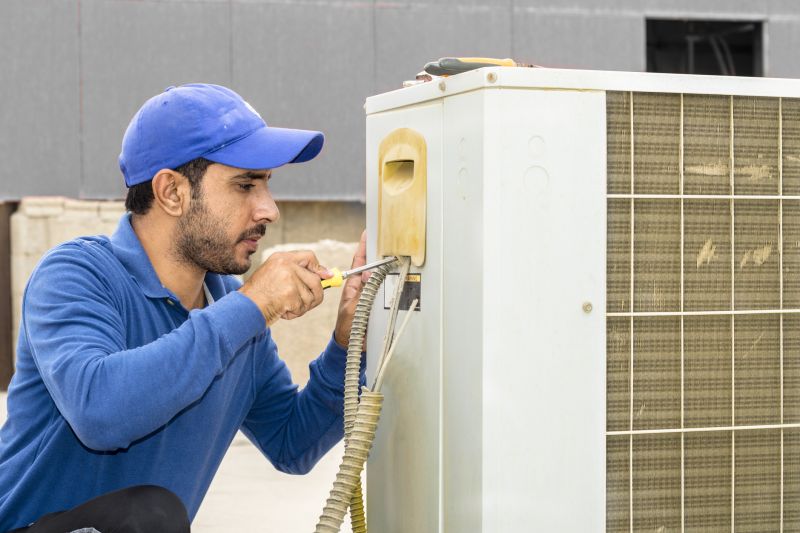Expert Picks For HVAC Service Product Essentials
Browse trusted equipment and accessories selected by industry professionals to optimize your HVAC operations.
 In the realm of HVAC service, having the right tools and products is essential for efficient and effective maintenance, repair, and installation work. Professionals and DIY enthusiasts alike benefit from a diverse selection of equipment designed to address various tasks, from diagnosing system issues to performing routine upkeep. High-quality HVAC products can help ensure safety, improve system performance, and extend the lifespan of heating and cooling units. When selecting products for HVAC service, it is important to consider compatibility, durability, and ease of use to meet specific job requirements.
In the realm of HVAC service, having the right tools and products is essential for efficient and effective maintenance, repair, and installation work. Professionals and DIY enthusiasts alike benefit from a diverse selection of equipment designed to address various tasks, from diagnosing system issues to performing routine upkeep. High-quality HVAC products can help ensure safety, improve system performance, and extend the lifespan of heating and cooling units. When selecting products for HVAC service, it is important to consider compatibility, durability, and ease of use to meet specific job requirements.
Types of Products For Hvac Service
Refrigerant Leak Detectors
Devices used to identify leaks in refrigerant lines, helping ensure system efficiency and safety.
Manifold Gauge Sets
Tools for measuring pressure in HVAC systems, essential for diagnosing and servicing refrigeration and air conditioning units.
Thermometers and Infrared Thermometers
Instruments for measuring temperature variations in HVAC components and airflow for troubleshooting.
Vacuum Pumps
Equipment used to evacuate air and moisture from refrigerant lines before charging with refrigerant.
Refrigerant Charging Hoses
Hoses that connect gauges and refrigerant cylinders, facilitating safe and accurate refrigerant charging.
Combustion Analyzers
Tools for analyzing combustion efficiency in furnaces and boilers to ensure proper operation.
Air Flow Meters
Devices for measuring airflow in ducts and vents, aiding in system balancing and troubleshooting.
Duct Inspection Cameras
Cameras designed for inspecting ductwork for blockages, leaks, or damage without invasive procedures.
Electrical Testers and Multimeters
Instruments for diagnosing electrical issues within HVAC systems, ensuring safety and proper function.
Pipe Wrenches and Tube Benders
Tools for installing and repairing refrigerant and water pipes, ensuring proper fit and seal.
Leak Detectors
Devices that detect refrigerant or air leaks in HVAC systems, supporting maintenance and repair.
Filter Cleaners and Replacements
Products for maintaining air filters, ensuring optimal airflow and indoor air quality.
Thermostats and Controls
Devices for regulating temperature and controlling HVAC system operation efficiently.
Humidistats and Dehumidifiers
Tools and devices for managing indoor humidity levels to improve comfort and system performance.
Insulation and Sealants
Materials used to insulate ductwork and seal leaks, enhancing system efficiency.
Cleaning Brushes and Coil Cleaners
Products for cleaning evaporator and condenser coils to maintain optimal heat transfer.
Safety Gear and Protective Equipment
Items such as gloves, goggles, and masks to ensure technician safety during service tasks.
Battery and Power Supply Tools
Portable power sources and batteries for operating tools in the field.
Popular Choices
Widely used for detecting refrigerant leaks in various HVAC systems.
Commonly employed for pressure measurement and system diagnostics.
Popular for quick temperature readings in HVAC troubleshooting.
Frequently used for evacuating refrigerant lines before recharging.
Essential for electrical diagnostics in HVAC systems.
Standard equipment for refrigerant transfer and system servicing.
In demand for non-invasive duct inspections.
Popular for analyzing furnace and boiler performance.
Commonly used for balancing airflow in HVAC systems.
Frequently utilized for identifying leaks in refrigerant lines.
Popular for maintaining clean heat exchange surfaces.
Widely installed for temperature regulation and system control.
Commonly used for sealing duct leaks and insulating components.
Standard protective gear for HVAC technicians.
Popular for portability and convenience in fieldwork.
Used for verifying system integrity and detecting leaks.
In demand for controlling indoor humidity levels.
Frequently purchased for maintaining air quality.
Pleasant Hill, CA, residents and HVAC technicians often seek reliable tools that can withstand the demands of frequent use and challenging environments. Whether working on residential or commercial systems, having access to a comprehensive range of products allows for a more streamlined workflow. From basic hand tools to specialized diagnostic equipment, the right products can make a significant difference in service quality and efficiency.
Investing in versatile and dependable HVAC service products also supports safety protocols, ensuring that technicians can perform tasks with confidence. Properly selected tools and accessories reduce the risk of accidents and improve the accuracy of repairs. As technology advances, newer products with innovative features continue to emerge, offering improved functionality and ease of operation. Staying informed about the latest offerings can help professionals maintain high standards of service while optimizing their work processes.
Key Buying Considerations
- Compatibility with existing HVAC systems and components.
- Durability and build quality of tools for frequent use.
- Ease of use and ergonomic design for comfort during extended work.
- Accuracy and precision of diagnostic instruments.
- Safety features and certifications for electrical and refrigerant tools.
- Portability and weight, especially for field technicians.
- Availability of replacement parts and accessories.
- Brand reputation and customer reviews.
- Warranty and customer support from manufacturers.
- Compatibility with different refrigerants and system types.
- Ease of calibration and maintenance of diagnostic equipment.
- Size and storage options for comprehensive tool kits.
- Cost and value for money relative to features offered.
- Compliance with industry standards and regulations.
- Availability of training or user guides for complex tools.
